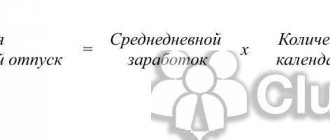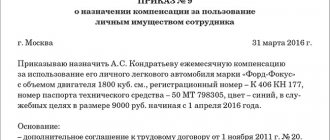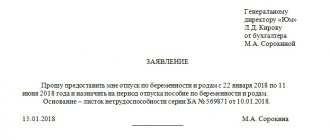Legislative regulation
The Labor Code of the Russian Federation clearly states all the points that employers are required to regulate when calculating the period of annual rest of a subordinate (Article 423 of the Labor Code of the Russian Federation), and financial payments in the event of its balance (Articles 126 and 127 of the Labor Code of the Russian Federation).
Cash compensation for annual paid leave is taxed, so this aspect of the issue is coordinated by the Tax Code.
Article 423 of the Labor Code of the Russian Federation “Application of laws and other regulatory legal acts”
Article 126 of the Labor Code of the Russian Federation “Replacement of annual paid leave with monetary compensation”
Article 127 of the Labor Code of the Russian Federation “Exercising the right to leave upon dismissal of an employee”
Results
Thus, it is important for employees in 2021 to remember that if they have more than 28 days of vacation left in 2021, then they can ask the employer to pay monetary compensation instead of these days. The employer needs to know that paying such compensation is his right, not his obligation. In addition, some groups of people (for example, pregnant women) cannot replace vacation with cash payments.
It is also important to understand that the payment of such compensation will be subject to personal income tax and insurance contributions, but the legislator allows it to be taken into account in income tax expenses. It is equally important for the employer to remember how to correctly calculate the amount of such compensation and document its payment (by order of the manager based on the employee’s application).
Sources:
- Labor Code of the Russian Federation
- Tax Code of the Russian Federation
You can find more complete information on the topic in ConsultantPlus. Free trial access to the system for 2 days.
Right to compensation
Each year, an employee can take a certain number of days to recuperate.
The citizen at the enterprise retains his workplace and his position. The manager, taking into account the average salary for the last year of the employee, is obliged to pay him for this period. A worker can take advantage of his opportunity to rest for the first time after six months of continuous work. And after eleven - get paid leave. It is issued to employees taking into account the established schedule.
The standard vacation period lasts 28 calendar days. There is a category of professions where a larger amount is allocated to it. In addition, additional rest time is provided for certain merits. A citizen can leave immediately for the entire legal period or take part of it, but not less than two weeks.
The Labor Code states that it is permissible to replace the vacation period with monetary compensation. This applies to the moment when an employee leaves the company.
At the request of the citizen, after drawing up an appropriate application before leaving, he can be given rest. The last working day coincides with the final vacation pay.
Interesting! A citizen leaving the company will not suffer financially, since there is only one system for calculating vacation pay and compensating vacation days upon dismissal.
Basic calculation rules
It is no secret that the amount of compensation directly depends on the vacation period unused for 12 consecutive working months, which can be all 28 days or some part of them.
But what if an employee has worked without rest for several years in a row, because then it turns out that he can claim compensation not for 28 days, but for a much longer period. The Labor Code, amendments to the current laws of which describe in detail all controversial situations without exception, will help determine how many years compensation for unused vacation can be paid. At the same time, not only the resigning employee, but also any other employee who did not take off the days allotted to him can claim a monetary payment, however, we are talking about partial compensation regulated by Article 126 of the Labor Code of the Russian Federation “Replacing annual paid leave with monetary compensation.”
Claimants for compensation
The amount of monetary compensation for unpaid vacation is proportional to its duration, so there are often situations when an employee is asked to go on vacation immediately before dismissal, although he has the right to refuse, demanding full or partial (relevant for two-week vacation before settlement) compensation in cash equivalent. Thus, the employer is obliged to pay the amount due to the resigning employee, regardless of the reasons for his leaving his position.
However, there is a category of persons who do not have the right to claim compensation, and the following employees are included in this list:
- pregnant women;
- minors;
- workers working in difficult and dangerous conditions.
In these cases, employees are required to take the full vacation days allotted to them by law, and the lack of the right to monetary compensation is an additional incentive for them. At the same time, employees who have not taken paid vacation for a long period of time are often interested in the same question regarding vacation compensation upon dismissal (how many years can the money be returned, and is the company obligated to pay it at all).
Contrary to popular belief, this situation is not controversial, despite the fact that by law the employer is obliged to provide annual leave with pay at the average tariff rate to all employees without exception, and especially to pregnant women, persons under eighteen years of age, and workers in difficult conditions. That is, it is impossible to postpone a scheduled vacation to a later date, and most often such cases are caused by force majeure.
However, in practice, things may be completely different and some employees, on their own initiative or at the request of management, deliberately do not go on vacation for several years in a row. When calculating, the employer may offer such employees cash compensation for only one vacation not taken, although in fact he is obliged to pay compensation for all vacation days spent at the workplace, no matter what period of time.
Examples of calculating vacation time
If, for several years, an employee has only partially used the holidays allotted to him by law, then upon receipt of the payment, he must be paid compensation for the days he did not take off during these years. For clarity, we can give the following example:
- Given: employee Ivanov took 23 days of vacation in 2014, 28 days in 2015, 20 days in 2021, 6 days in 2021 and did not go on vacation in 2021. On September 25, 2018, he submitted an application for payment, taking 14 days of vacation before his official dismissal 10/9/2018 and having actually worked 9 full months this year.
- Find: the calculation period for determining compensation for vacations that were not used by the employee.
- Solution: R/n=(28−23)+(28−28)+(28−20)+(28−6)+28/12*9−14=42 days.
When determining the settlement period when calculating compensation upon dismissal, it is necessary to take into account not only the main leave of 28 days, but also additional paid rest, if the employee is entitled to it under the employment contract.
Currently, there are the following categories of applicants for additional leave:
- employees working in difficult or hazardous conditions;
- employees engaged in some special professional activity;
- workers above the norm (subject to fixing an irregular work schedule);
- working in harsh climatic conditions (in the Far North or in territories with a status equivalent to this);
- employees of enterprises where additional rest is provided for by internal regulations as an incentive or compensation for any merits or achievements.
There are other situations when an employee does not use additional rest or time off, but the vacation period for calculating compensation will include only those vacations that are paid by the company. Moreover, these days include not only holidays, but also sick leave, so separate compensation for them will not be provided.
Payment terms and delays
If the company, represented by the management, refuses to fulfill its obligations and the next day after the official dismissal the employee received only the estimated or insufficient amount of compensation, then he can safely file a complaint with the labor inspectorate.
If this measure does not bring the desired result, then the next instance for proceedings with the unscrupulous employer will be the court. In this case, for each subsequent day of delay, a penalty will be charged for late payment, which is calculated using a separate formula. The calculation of compensation itself is carried out immediately before its payment. If a delay was recorded, then the employer is obliged to repay the debt (reimbursement for vacation and penalties accrued during this period), taking into account the day of payment.
For refusal to repay the debt, the employer is subject to penalties in the amount of 100 to 500 thousand Russian rubles or in an amount equal to the average annual salary of the employee who did not receive benefits. In addition, management who violated the regulations may be removed from their positions and prohibited from working in management positions for the next few years. In particularly severe cases, unscrupulous employers face forced labor or a year's imprisonment.
Sometimes controversial issues arise based on the calculation of the vacation period when dismissal in the middle of the working month, because the amount of compensation directly depends on this indicator. These disputes are resolved according to the rules of simple arithmetic by rounding up or down the number of days worked per month of calculation.
And if, for example, an employee worked for two weeks, then this month will be counted as a full month, that is, compensation will be calculated taking into account this billing period. In the opposite situation (working up to 14 days in a calculation month), this period will not be taken into account at all, despite the fact that we are only talking about calculating the amount of monetary compensation for vacation, and not at all about determining the amount of severance pay, which is calculated separately.
All time off that the employee took at his own expense must also be excluded from the vacation record. The concept of vacation at your own expense falls into the same category. As an example, here is a fairly common situation:
- Condition: employee Nikolaeva worked as an inspector of the second category in the period from 08/22/2016 to 10/25/2017, and upon dismissal she was entitled to compensation for unused vacation. For how many years and months will it be calculated if in 2021 Nikolaeva took 15 days of leave to care for her disabled mother at her own expense in the period from 10.10 to 25.10.2017.
- Solution: Since the employee worked less than 14 days in the month of admission, it will not be included in the vacation period. In the month of dismissal, the employee worked 25−15 = 10 days, so it also cannot be counted as full. That is, in fact, she worked for 1 year 1 month or 13 months. The calculation period according to these data is 28/12*13=30 days.
The hundredths obtained in calculations are usually rounded up or down according to the laws of arithmetic. The same algorithm must be used when determining the calculation period for monetary compensation for unused vacation without subsequent dismissal.
Where does it come from?
For various reasons, a worker may not go on vacation. Then these days are postponed or the rest is extended if the employee:
- carried out assignments during the vacation period;
- had a disease and issued a sick leave certificate at a medical institution.
Legislative acts indicate a number of other possible cases.
A new date is set and the vacation is extended at the initiative of the organization’s management, but taking into account the employee’s opinion.
Important! When transferring vacation days, they must be used no later than next year.
If a production need arises, a person may be recalled from vacation with his consent. He can take it for a walk later, or he can add these days to the next rest period.
Read also: How to check 6-NDFL for errors
It is impossible, according to legal acts, to invite the following to perform their duties on vacation days:
- pregnant women;
- minor workers;
- hazardous workers.
The law prohibits not providing rest to employees for two years.
Compensation for part of the vacation, subject to the availability of additional vacation
If the employee intends to continue working in the company, then only part of the annual paid leave exceeding 28 calendar days can be replaced with compensation. That is, such compensation is provided for those categories of workers who, by law, are entitled to extended basic leave - more than 28 days. These include:
- disabled workers, duration of leave is at least 30 calendar days (Article 23 of Federal Law No. 181-FZ of November 24, 1995);
- minor workers, vacation duration - 31 calendar days (Article 267 of the Labor Code of the Russian Federation);
- municipal employees, vacation duration - 30 calendar days (Clause 3, Article 21 of Federal Law No. 25-FZ dated 03/02/2007).
There are also categories of employees who are entitled by law to annual additional paid leave:
- workers engaged in work with harmful and (or) dangerous working conditions (Article 117 of the Labor Code of the Russian Federation);
- employees with a special nature of work (Article 118 of the Labor Code of the Russian Federation);
- workers with irregular working hours (Article 119 of the Labor Code of the Russian Federation);
- workers working in the regions of the Far North and equivalent areas (Article 321 of the Labor Code of the Russian Federation, Article 14 of the Law of the Russian Federation of February 19, 1993 No. 4520-1).
Additional paid holidays may be established at the discretion of the employer, taking into account production and financial circumstances. At the same time, the conditions and procedure for granting such leaves are prescribed by collective agreements or local regulations.
It is worth noting that replacing part of the vacation with monetary compensation is not an obligation, but a right of the employer. Therefore, he may refuse compensation. This position is formulated, in particular, in the Decision of the Supreme Court of the Komi Republic dated August 15. 2011 No. 33-4410/2011).
In Part 3 of Art. 126 of the Labor Code of the Russian Federation identifies categories of employees in respect of whom the replacement of annual basic paid leave and annual additional paid leave with monetary compensation is not allowed:
- pregnant women;
- workers under 18 years of age;
- employees engaged in work with harmful or dangerous working conditions - they are not replaced by money with annual additional paid leave.
All these employees can receive compensation for vacation only in one case - upon dismissal.
The minimum duration of additional leave is 7 calendar days (Article 117 of the Labor Code of the Russian Federation). However, the specific duration of such rest is established by the employment contract on the basis of an industry agreement and a collective agreement.
That part of the vacation that exceeds 7 calendar days can be replaced by compensation. To do this, the employee needs to write an application to replace the vacation with compensation. In addition, the provision for replacing additional leave with money must be reflected in the industry agreement or collective agreement.
An employee exposed to radiation as a result of the Chernobyl disaster is not subject to compensation for unused additional annual paid leave (provided on the basis of clause 5 of Article 14 of the Law of the Russian Federation of May 15, 1991 No. 1244-1).
Deadline for payment of compensation for unused vacation
The company is obliged to make final settlements with the resigning employee on his final working day (Article 140 of the Labor Code of the Russian Federation). He is provided with:
- required salary;
- bonus part (if exists);
- monetary compensation for vacation.
Other finances may also be given if they are provided for in a collective or employment agreement.
Article 140 of the Labor Code of the Russian Federation “Terms of calculation upon dismissal”
Use of vacation before dismissal
According to Article 127 of the Labor Code of the Russian Federation, when planning to terminate the contract, an employee can take the leave due to him and then resign at his own request. They write a statement indicating the date of dismissal, which should be the last day of vacation. If the term of the employment contract has expired, the employee has the right to use the allotted vacation before dismissal and the date of termination of the contract will also be the last day of vacation.
This date may not coincide with the previously established end date of the employment contract. If a vacation is taken by an employee who has written a resignation letter of his own free will, he has the right to change his mind and withdraw the resignation letter before the start of the vacation. If another employee is hired in his place, then withdrawal of the application for dismissal is not allowed (Article 127 of the Labor Code of the Russian Federation).
Determination of the due period
Legislative acts do not specify specific rules for calculating days of earned rest.
However, in Art. 423 of the Labor Code clearly states that monetary compensation for annual leave should be carried out in proportion to them. When calculating, you need to take into account the number of fully worked months in the company. For each, starting from the first, you are entitled to 2.33 days of rest. Accordingly, for six months of work the employee is entitled to 13.98 days, and for eleven - 28.
Additional days are granted to employees of the following categories:
- those employed in harmful and difficult conditions - 7 days (Article 117 of the Labor Code of the Russian Federation);
- medical workers;
- with irregular working hours - 3 days (Article 119 of the Labor Code of the Russian Federation);
- people with disabilities;
- civil servants;
- in the Far North and equivalent areas - 24 and 16 days;
- teachers;
- scientific staff.
Note! Holidays during vacation are not included in it and are not paid.
Article 117 of the Labor Code of the Russian Federation “Annual additional paid leave for employees engaged in work with harmful and (or) dangerous working conditions”
Article 119 of the Labor Code of the Russian Federation “Annual additional paid leave for employees with irregular working hours”
Why is vacation transfer allowed?
The legislator stipulated the occurrence of situations during vacation when annual leave must be interrupted or granted at a different time. Such cases are:
- transfer of leave due to sick leave;
- the need to perform government duties, during which time exemption from work is granted by law;
- in other cases.
Non-payment of vacation pay, notification of vacation less than 14 days before its start also becomes the basis for transferring the vacation to another period agreed with the employee.
If the production process requires the presence of an employee and his going on vacation paralyzes the activities of the organization, with the consent of the employee, the vacation is also postponed to another period of time. However, it must be used within the year following the year of provision. That is, working for 2 years without vacation is acceptable.
Therefore, if you need to find out whether it is permissible to replace vacation with monetary compensation in the event of its postponement, remember that in this case the legislator says “no” (Article 124 of the Labor Code of the Russian Federation).
Workers who are under 18 years of age, as well as those employed in hazardous and hazardous industries, must be granted leave annually; transfers are not allowed.
When are these deductions possible?
After an employee writes an application for termination of employment, he is required to calculate and pay compensation for vacation upon dismissal on the basis of Art.
126, 127 Labor Code of the Russian Federation. However, the legislation provides for a category of persons to whom it will not be issued. These employees include:
- citizens under 18 years of age;
- women expecting a child;
- people engaged in hard and dangerous work.
All other workers have the right to receive financial payments.
What to do in case of non-payment?
If the employer did not pay the employee the required amount of compensation upon dismissal, then the dismissed person has the right to complain.
You can immediately go to court with a claim if management categorically refuses to pay.
A simpler option is to contact the Labor Inspectorate. To do this, write a complaint in the form of an application, explain the essence of the appeal and request to consider the issue and hold the employer accountable and oblige you to pay the due funds.
In addition to the compensation itself, the employee can also count on an additional compensation payment for each day of delay in the amount of 1/150 of the refinancing rate of the unpaid amount.
When going to court, you can also demand compensation for moral damage.
The complaint must be accompanied by documents that can confirm the fact of dismissal and non-payment of wages (employment contract, book, job description, testimony of colleagues, etc.).
Compensation calculation
It is necessary to determine the amount of cash payments for the entire last year, and then calculate for one day. Then multiply by the number of vacation days due.
How are cash payments calculated without dismissal?
The algorithm for determining compensation for unused vacation for employees who continue to work at the enterprise is no different from that for the termination of an employment agreement.
The law sets some restrictions. In Art. 126 of the Labor Code of the Russian Federation clearly states that an employee has the right, upon written request, to ask for monetary compensation for unpaid vacation, but only for that part that exceeds 28 days.
Leave compensation upon dismissal
In order for the accounting department to begin the process of determining finances in this case, the employee must receive written notice of termination of cooperation with this organization.
The main principles of this procedure are:
- settlement is made immediately before payment;
- Attention is drawn to the period worked.
Interesting! The number of working months is calculated. If more than two weeks are worked, they are rounded up to a full month.
Calculation of allotted calendar days of vacation
For such mathematical calculations, it is necessary to know the number of complete months actually worked. They are multiplied by 2.33 (this is the number of vacation days allotted per year divided by 12). If the result is a fractional number, then, according to the letter from the Ministry of Health and Social Development of the Russian Federation, it should be rounded in favor of the worker. So, if the result is 25.23, then round up to 26.
Important! Compensation for unused vacation in 2021 is 2.33 days per month worked.
If working days are taken into account
There are situations when you need to determine the number of vacation periods due, taking into account not calendar, but working days. The number of vacation days from this calculation is 24 days. They are divided by 12. The resulting number (2) should be multiplied by the number of months worked. This calculation principle applies in the following cases:
- for seasonal workers;
- when drawing up an employment contract for a period of up to 60 days.
Read also: Inventory shortage
In what cases is compensation for vacation provided without dismissal?
According to the Labor Code, each employee who has worked for the company for 1 year is entitled to at least 28 days of paid leave annually.
But in practice, few workers, especially in medium-sized and large companies, manage to take all 28 days off in a year. There can be many reasons: there was no desire, the manager did not let me go due to high workload, etc. For all possible reasons, the consequences are the same. Art. 126 of the Labor Code of the Russian Federation allows the company, instead of vacation days that the employee does not want to use, to pay him monetary compensation.
IMPORTANT! In Art. 126 of the Labor Code of the Russian Federation enshrines the right of the company’s management, and not the obligation, so the final decision on the issue in any case will remain with the organization.
However, the company does not always have the right to accommodate an employee who wants to receive money in exchange for certain vacation days. The Labor Code of the Russian Federation establishes a special list of persons who must be provided with leave, and not compensation replacing it. Such persons include (Article 126 of the Labor Code of the Russian Federation):
- pregnant women;
- minors (under 18 years of age);
- persons who work in conditions considered harmful or dangerous;
- employees who were exposed to radiation as a result of the accident at the Chernobyl nuclear power plant (letter of the Ministry of Labor of the Russian Federation dated March 26, 2014 No. 13-7/B-234).
NOTE! For persons working in harmful or dangerous conditions, one exception is established: only the minimum additional leave, which is 7 days, cannot be replaced with a cash payment. This means that if, for example, an employee has the right by law to 10 days of additional leave, then only instead of 3 days of such leave can money be paid.
If the employee does not fall into any of the listed categories, the company may, at his request, replace the vacation with a cash payment.
But the following is important here: you can pay money only in lieu of those days that exceed the 28 days of vacation that an employee is entitled to per year. This rule applies to vacation for each year separately. The parts of vacation not taken for different years in the amount of no more than 28 days are not summed up for the purpose of calculating compensation.
A situation similar to the above is when an employee decides to quit without taking the full vacation allotted to him. Can he then count on compensation?
For more details, see the article “Calculation of compensation for unused vacation according to the Labor Code of the Russian Federation .
Example
The employee did not take advantage of vacation during 2021; he had 28 days left. A similar situation repeated itself in 2021. Neither in 2019 nor in 2021 did the total number of vacation days for an employee exceed (calculated separately for each year) 28 days. Therefore, the employee cannot count on replacing the 2019-2020 vacation with a cash payment.
The question arises: in what cases can one demand compensation for vacation left over from past years of work in the company? Only if the employee has the right to extended or additional leave (for example, disabled workers, etc.).
IMPORTANT! Even if the employing company is not obliged to provide increased leave to an employee due to the direct requirements of the Labor Code of the Russian Federation, it has the right to do this independently by securing such leave in the local regulatory legal acts (for example, upon reaching a certain number of years of work experience in the company, the employee’s leave increases by some amount of days).
How to get compensation
A citizen can have financial compensation only after submitting a petition in writing. The law does not provide for a specially established sample. You need to write to the head of the enterprise in free form.
Statement
When compiling it, it is advisable to indicate the following points:
- personal data of the applicant;
- name of the company and surname of the director;
- when indicating your request, refer to articles of law;
- the period of work for which leave must be taken and its type (main or additional);
- At the end there is a date and signature.
Sample application for compensation for unused vacation
Advice! The document can be printed or handwritten.
Legal regulation
Payment of compensation for unused vacation is made at strictly specified times by law. Most of the nuances are regulated by the Labor Code of the Russian Federation:
- Art. 126 – monetary compensation for vacation days exceeding the standard 28;
- Art. 127 – the same, but upon dismissal;
- Art. 115–120 – duration of main and additional leave;
- Art. 423 – on the proportionality of the amount of funds received in return for unused vacation days;
- Art. 251–351 – features of regulation of working and rest conditions of certain categories of citizens.
The right of representatives of certain professions to receive monetary compensation in return for unused vacation is established by Part IV of the Labor Code of the Russian Federation and ministerial letters and orders. The procedure for calculating length of service, calculating the number of days due for compensation and other nuances are regulated by the following regulations:
- Rules on regular and additional holidays, approved by the USSR People's Commissariat of Labor in 1930, as amended in 2010;
- Letter of the Ministry of Health and Social Development No. 4334-17 dated December 7, 2005;
- Letter of the Federal Service for Labor and Employment No. 944-6 dated June 23, 2006;
- Letter of Rostrud No. 5921-TZ dated October 31, 2008;
- Decree of the Government of the Russian Federation No. 922 of December 24, 2007;
- International Convention “On Paid Holidays” No. 132 (ratified on July 1, 2010).
Registration of compensation
If the manager agrees to reimburse the subordinate for unpaid vacation, then he puts a resolution on the application.
This issue is agreed upon with the head of the department and the chief accountant. Further, such an employee is included in the order, which is assigned a number. It consists of two parts:
- The text of the statement is repeated;
- An order is given to the accounting department to release funds.
The employee confirms familiarization with this document with his signature.
Order to replace vacation with monetary compensation
StroyMet LLC
Order No. 15-OK
On replacing part of the vacation with monetary compensation
Ryazan 05/18/2020
In connection with the excess of annual paid leave, as well as on the basis of a statement received from accountant A. V. Mishina dated 05/11/2020 and in accordance with Art. 126 TK,
I ORDER:
- Accountant Mishina A.V., instead of part of the next vacation that exceeded 28 days, in the amount of 5 calendar days, must pay monetary compensation.
- To accrue and make compensation payments to the chief accountant Ilyina P.K.
- Responsibility for the execution of the order should be assigned to the chief accountant Ilyina P.K.
General Director Ushkin Ushkin R.A.
The order has been reviewed by: Mishina Mishina A.V.
Ilyina Ilyina P.K.
Replacement of vacation with monetary compensation
Along with understanding the methodology for calculating the amount of monetary compensation in lieu of leave, as well as the tax consequences of its payment, the company must clearly understand what basic steps need to be taken in order to pay such compensation to an employee.
Often employees take the rest of their vacation and quit immediately after.
For more information on this, see Art. “How to properly arrange leave followed by dismissal?” .
First, it is necessary for the employee to contact the employer with a corresponding application.
After the application is received, the company's management must decide whether to provide compensation or not.
If it was decided to replace unused vacation with a certain amount of money, then the organization should then generate a corresponding order in any form.
IMPORTANT! Such an order must necessarily indicate information about the employee, the number of vacation days that the employer intends to compensate in money, as well as a reference to the basis for payment of such compensation (the corresponding statement from the employee).
Next, you should not forget to reflect the fact of replacing unused vacation days with a cash payment in the employee’s personal card (Form No. T-2). In particular, in section VIII “Vacation” of such a card, it is necessary to indicate the basis (for example, additional leave) for providing compensation, and also refer to the completed order of the manager for this employee.
After which, the fact of replacing vacation with a cash payment must be recorded in the vacation schedule in order to prevent confusion in the future. In the schedule, as a note (column 10), you need to indicate how many days were compensated with money, and also provide details of the manager’s order
For more information on how to draw up such a vacation schedule, see the article “Vacation schedule - form and sample for filling out in 2021” .
Taxation issues
Like other incomes of citizens, this payment of compensation for unused vacation is subject to tax. However, according to Art. 217 of the Tax Code of the Russian Federation, they can be taken only in the following cases:
- payment occurs on the final working day;
- the employee receives money on payday and does not quit.
In other cases, personal income tax is not provided.
Attention! Financial costs for compensating an employee for vacation are taken into account in the company’s general expenses (Article 255 of the Tax Code of the Russian Federation).
The employer is obliged to transfer the tax to the country's budget no later than the day after payment of funds to the employee (Article 226 of the Tax Code of the Russian Federation).
Contributions to the Pension Fund, Social Insurance Fund and Unified Social Tax are not paid.
Article 217 of the Tax Code of the Russian Federation “Income not subject to taxation (exempt from taxation)”
Article 255 of the Tax Code of the Russian Federation “Labor expenses”
Read also: Explanatory note to the balance sheet
Article 226 of the Tax Code of the Russian Federation “Features of tax calculation by tax agents. Procedure and deadlines for tax payment by tax agents"
When is this payment calculated?
The employer is obliged to pay for the days of the main vacation not used by the employee upon his dismissal (Article 127 of the Labor Code). This provision applies to both permanent and temporary and seasonal employees.
Alternatively, the employer can offer the employee to take a vacation immediately before dismissal, but the right to choose remains with the latter.
If an employer literally forces an employee who is about to quit on vacation and is entitled to payment for parts of the main vacation accumulated during work, he is breaking the law.
Features of calculating compensation in some situations
For any calculation, you need to determine the number of rest days accumulated, and then unused. And then find out the amount of the refund itself.
| Compensation for unused vacation | = | Number of unused days | * | Average daily earnings |
- Maternity leave. This issue is controlled by the Rules on Additional Leave and Art. 127 Labor Code of the Russian Federation. In this case, you need to take into account the amount of wages per day, the total number of vacation days for which compensation will be received. This category of workers is carefully controlled by the government. Therefore, it is necessary for responsible persons to be attentive;
- Part-time worker. According to the Labor Code of the Russian Federation, the accrual procedure is the same as for ordinary employees;
- Upon dismissal by transfer. In this case, employers are guided by Art. 127 Labor Code of the Russian Federation. The compensation mechanism for unused vacation days does not differ from the standard one;
- For additional vacation. The amount of the payment is calculated in the same way as all other compensation. It is given to the employee on the day of salary payment.
When staffing is reduced
An employee who has been laid off must be paid the following amounts:
- earnings for the period worked;
- severance pay;
- compensation for unused vacation.
The calculation procedure is no different from other grounds for dismissal.
Payments must be made on the last working day before the layoff.
Personal income tax must be withheld from the accrued compensation and insurance premiums must be paid.
Liability for non-payment of compensation
The law provides for punishment for employers who violate the terms and amounts of payments. It could be:
- removal from office for a period of one year;
- imprisonment up to 12 months;
- forced labor for several years.
The following penalties are provided:
- for legal entities - from 30,000 to 50,000 rubles;
- individual entrepreneurs - 1000–5000 rubles;
- for officials - from 10 to 20 thousand rubles.
After making a decision to terminate labor cooperation with his employer, a citizen, along with his work book, has the right to receive cash payments. The bulk of them may consist of compensation for unused vacation. Therefore, knowing the rules for calculating their quantity and the principle of payment, you can control your income.
Vacation debt has accumulated - what to do?
Employees often accumulate vacation arrears over several years. And in such cases, the employer is faced with the question: how to deal with these “debts”? Will it be enough to compensate them with money?
Art. 126 of the Labor Code of the Russian Federation establishes the basic norm for vacations: every citizen of the Russian Federation is guaranteed 28 days of rest per year worked. And he must use these days “in their natural form.”
Thus, if an employer has a debt of, for example, 100 days of vacation, because the employee has not taken vacation for 4 years, then he cannot simply replace this debt with compensation. Only if the employee quits. And in case of dismissal, the employer will have to pay compensation for all unused vacations, that is, for 4 years.
Additional rest
The company is obliged to give the employee the opportunity to use compulsory leave. At his request, part of it, exceeding 28 days for each year worked by him, can be compensated by appropriate additional payments. For many workers, this is the length of their entire mandatory annual vacation. However, for some categories longer leave is provided.
This applies to the following employees:
- Those who work in the northern regions of the country.
- Workers in the teaching field.
- Those who work in the medical field.
- If you have a disability confirmed by official documents.
- Researchers and teaching staff of universities.
- Various categories of government employees.
- Those who work in the scientific field.
How to calculate compensation
To determine the amount of monetary compensation to be paid to the employee, you need to multiply the average daily earnings by the number of days replaced by compensation.
Note. The amount of monetary compensation paid in lieu of vacation is calculated based on the employee’s average daily earnings.
The average daily earnings in this case are calculated according to the rules for calculating vacation pay. They are established by Article 139 of the Labor Code of the Russian Federation and clause 10 of the Regulations on the specifics of the procedure for calculating average wages (approved by Decree of the Government of the Russian Federation of December 24, 2007 N 922).
So, if the employee worked the entire billing period, you should divide the actual amount of the employee’s salary for this billing period by 12 and by 29.3 (the average monthly number of calendar days).
If one or more months of the billing period are not fully worked out or there were excluded periods, then the average daily earnings are calculated as follows. First, determine the number of calendar days in fully worked calendar months:
KDMP = KMP x 29.3,
where KDMP is the number of calendar days in fully worked months of the billing period;
KMP - number of fully worked months;
29.3 is the average monthly number of calendar days.
Next, calculate the number of calendar days in months not fully worked by the employee. To do this, use the following formula:
KDMN = 29.3: KKDMN x CODE,
where KDMN is the number of calendar days in a month that is not fully worked;
KKDMN - the number of calendar days of the month that is not fully worked;
CODE - the number of calendar days worked in a given month.
If there are several months that are not fully worked, then the number of calendar days must be determined for each of them. And then add up the results.
Then calculate the total number of calendar days taken into account when determining average earnings:
KKD = KDMP + KDMN,
where KKD is the number of calendar days taken into account when calculating average earnings.
Finally, determine your average daily earnings:
NW = NE: KKD,
where SZ is the average daily earnings;
SV - the amount of payments accrued to the employee in the billing period.
Example 2. An employee of AvtoLombard LLC, O.V. According to the employment contract, Simonova is entitled to additional leave of 4 calendar days. She appealed to the employer with a request to replace this part of the vacation with monetary compensation. The billing period is from August 1, 2013 to July 31, 2014. From April 1 to April 28, 2014 O.V. Simonova was on regular vacation for 28 calendar days. And in January 2014, the employee was sick for 10 days. The remaining months of the billing period have been fully worked out.
Over the last 12 calendar months, payments in favor of the employee amounted to 420,500 rubles, of which vacation pay was 29,800 rubles. and payments for a certificate of incapacity for work - 9200 rubles. We will calculate the amount of compensation that the employee is entitled to.
First, we determine the number of calendar days in fully worked months. It is 234 days. (8 months x 29.3 days). Now let's calculate the number of days in months not fully worked. For January 2014 it is equal to 19.85 days. (29.3 days: 31 days x 21 days), for April 2014 - 1.95 days. (29.3 days: 30 days x 2 days). The total number of days in months not fully worked was 21.8 days. (19.85 days + 1.95 days).
The number of calendar days taken into account when calculating average earnings is 255.8 days. (234 days + 21.8 days). The payments taken into account do not include average earnings maintained during vacation and temporary disability benefits. Therefore, vacation pay must be calculated based on RUB 381,500. (RUB 420,500 - RUB 29,800 - RUB 9,200). The average daily earnings for calculating compensation will be 1,491.4 rubles. (RUB 381,500: 255.8 days). The amount of compensation to be paid to O.V. Simonova, will be 5965.6 rubles. (RUB 1,264.04 x 4 days).
Please note that labor legislation does not define the period within which you must pay compensation to the employee in lieu of vacation. But we recommend doing this on the next day established for payment of wages.
Note. FAQ
Is it possible to replace study leave with monetary compensation?
No. Labor legislation allows only part of the annual paid leave to be replaced with monetary compensation (Articles 126 and 127 of the Labor Code of the Russian Federation). And your employee’s study leave is not related to annual paid leave. It is considered additional targeted leave related to training (Articles 173-176 of the Labor Code of the Russian Federation).
What will happen to us if we replace an employee’s vacation not exceeding 28 calendar days with money?
In this case, you may be held accountable under Article 5.27 of the Code of Administrative Offenses of the Russian Federation for violating labor laws. The head of the company faces a fine of 1,000 to 5,000 rubles. For a repeated violation, he may be disqualified for a period of one to three years. And an organization can be fined in the amount of 30,000 to 50,000 rubles, and an entrepreneur - from 1,000 to 5,000 rubles. Instead of a fine, the organization and businessman may face suspension of activities for up to 90 days. True, this violation can only be detected if the labor inspectorate comes to you with an inspection.
How many unused vacations can “accumulate” in a row?
An employee may take unpaid leave for the following reasons:
- If an employee falls ill while on vacation (the illness must be documented by a certificate of incapacity for work).
- If the employee performed any government duties.
- In other cases provided for by law.
If an employee does not receive vacation pay on time, he may also request that the vacation be transferred to another date. In rare cases, non-compulsory leave is created if the absence of an employee from his work place could negatively affect productivity. But such a transfer of vacation to the next year must obtain the employee’s consent.
Legislatively, the question of how much vacation an employee can accrue is not regulated in any way. Consequently, an employee can accumulate an unlimited number of unused vacations in a row (for example, over 5 years). The main thing is that the lack of vacation over the past few years does not occur on the initiative of the employer, otherwise he is breaking the law.
An employee can accumulate several vacation days. These periods do not expire and you can receive compensation for them upon dismissal.
Is it possible to transfer
If, due to any circumstances, employees have unused annual leave for the previous period, then they retain the right to use all due annual leave. This right is reserved to them by Art. 114, 122, 124.
According to Rostrud letter No. 1921-6 of 2007, annual paid leave for the previous period can be provided as part of the vacation schedule for the next year or by agreement between the employee and the employer. Several vacations may be taken during a calendar year.
In Rostrud Letter No. 473-6-0 of 2007, department specialists point out that labor legislation does not contain provisions that would provide for the use of vacations in chronological order. That is, annual leave can be granted in any order: for example, first for the current year, then for the previous one.
In what cases can you replace vacation with money?
When an employee has worked at the company for a certain time, he receives the right to another vacation. However, it is not always possible to use it. There may be various reasons for this:
- impossibility for any reason to interrupt your work during this time;
- Changed personal circumstances that do not allow you to spend your vacation as expected.
The law prohibits a boss from refusing to grant his employee leave, but he himself has the opportunity to voluntarily decide not to take it. In this situation, he retains the right to unearned vacation days and can use them in subsequent years.
However, in some cases, the employee is given the right to receive monetary compensation for unused days. This is beneficial from a financial point of view, but can be harmful to health. If this happens for several years in a row, it can lead to significant problems in this area.
It is important to note that the opportunity to receive compensation for vacation does not apply to its first 28 days. In this case, it is impossible for a working employee to pay money in his place, even at his request. Money can only be received in lieu of other vacation days. This requirement is set out in Article 126 of the Labor Code of the Russian Federation.
This raises the question of in what cases the duration of legal rest exceeds this period. An example is the rights granted to workers in the Far North. An additional 24 days are provided for them, which they may not use if they wish. In this case, they become entitled to receive the appropriate amount.
Briefly
- It is possible to replace vacation with a cash payment to a working citizen only to the extent that it exceeds 28 mandatory days of annual rest.
- Citizens who work at harmful and dangerous facilities receive compensation also taking into account the days of additional rest that are obligatory for them (7). If the additional leave is longer than one week, it is possible to obtain compensation for this period.
- You can ask in your application for compensation for all vacation days at once, taking into account the requirements of the law, or part of them.
- The employer has the right to pay compensation, but he has no such obligation.
- If a citizen resigns, the company is obliged to pay compensation for vacation without an application.
- Compensation is calculated based on average earnings for the year, taking into account the actual time worked. The length of service that gives the right to vacation is also taken into account. Having worked for the company for more than half a month, an employee can already count on compensation for 2.33 earned vacation days.
What taxes and contributions should be charged on compensation paid?
As a general rule, compensation paid in lieu of vacation is the employee’s income. It is not mentioned in the list of payments not subject to personal income tax (Article 217 of the Tax Code of the Russian Federation). Accordingly, from its amount you need to calculate, withhold and transfer personal income tax to the budget. About this - letter of the Federal Tax Service of Russia dated March 13, 2006 N 04-1-03/133. Personal income tax should be paid to the budget on the day you receive money from the bank to pay compensation or on the day it is transferred to the employee’s bank account.
Also, the amount of compensation paid to the employee is subject to contributions to the Pension Fund, Social Insurance Fund and Federal Compulsory Medical Insurance Fund. This is directly provided for by subparagraph “i” of paragraph 2 of part 1 of article 9 of the Federal Law of July 24, 2009 N 212-FZ and paragraph 13 of subparagraph 2 of paragraph 1 of article 20.2 of the Federal Law of July 24, 2009 N 125-FZ. This conclusion is also confirmed by the regulatory authorities (letter of the Federal Insurance Service of the Russian Federation dated November 17, 2011 N 14-03-11/08-13985).
Compensation upon dismissal
The Labor Code does not establish a rule for calculating compensation upon dismissal. Therefore, employers should be guided by the old document - “Rules on regular and additional leaves” (approved by the People's Commissariat of Labor of the USSR on April 30, 1930 No. 169).
In the Rules, it is important to pay attention to clause 35, which states that “when calculating the terms of work that give the right to proportional additional leave or compensation for leave upon dismissal, surpluses amounting to less than half a month are excluded from the calculation, and surpluses amounting to not less than half a month, rounded up to a full month.”
In connection with this rule, the question may arise: how to count half of the month in February, which, as you know, has 28 days? You need to focus not on the calendar month, but on the working month, since vacation is provided for the working year.
Let's say you hired an employee on September 17, 2021. He will retire as of November 30, 2021. The employer needs to see how many full months the employee has worked. The first two months were fully worked out: from 09/17/18 to 10/16/18 and from 10/17/18 to 11/16/18. And the employee worked the third month from 11/17/18 to 11/30/18, therefore, according to clause 35 of the “Rules on regular and additional leaves”, compensation must be paid only for two months.










